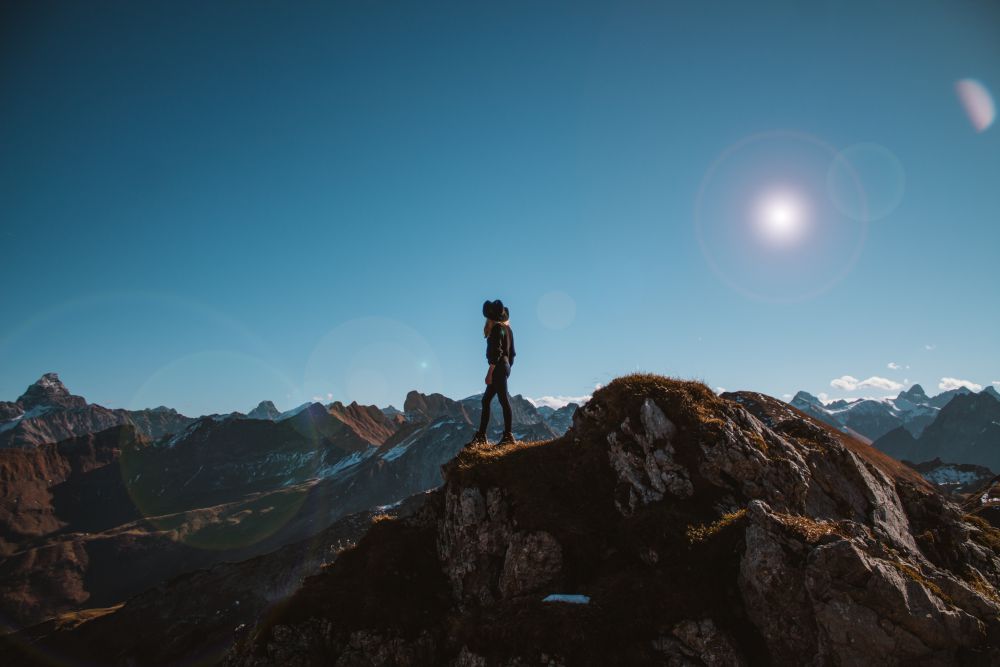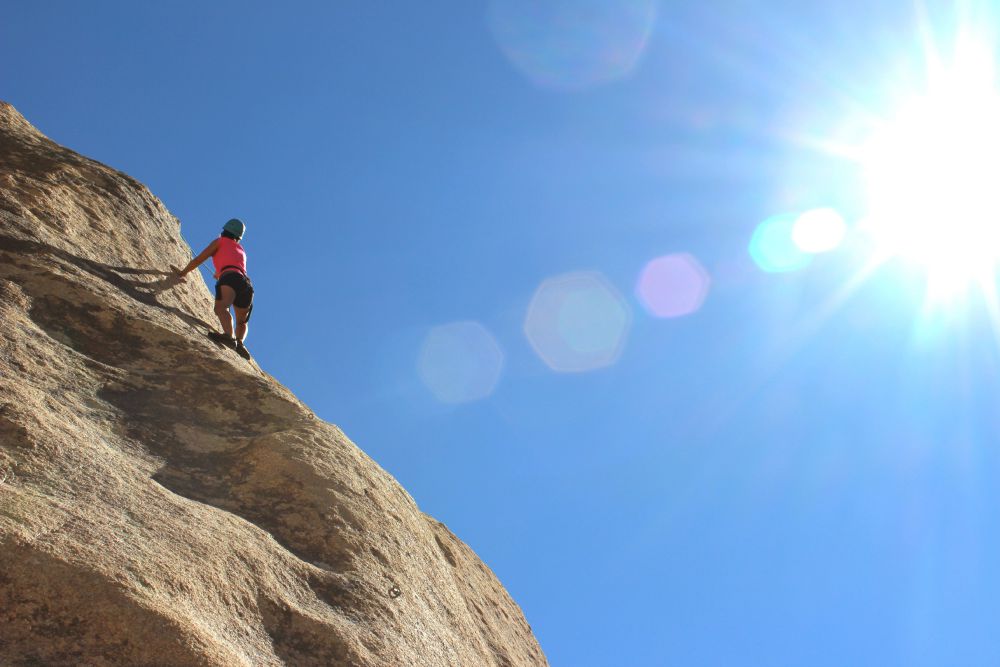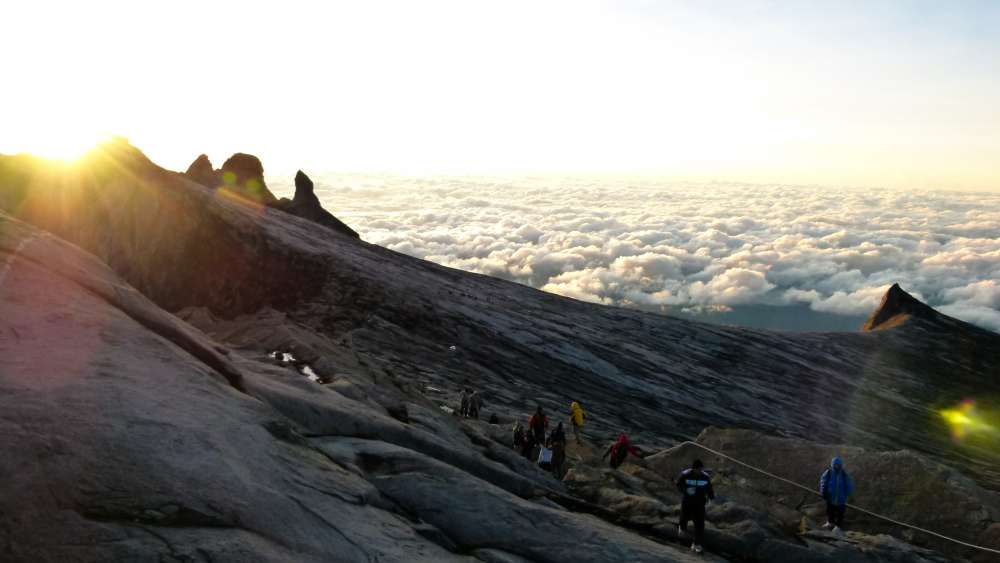Climb and Conquer. What makes Mountain-Climbing such an Effective Exercise and Therapy?

Nature heals. There is something about mountain climbing that renews one’s sense of wonder. The trail and the dirt cleanse and exhilarate. It can get tiring during the first hour, and you might ask yourself if you really want to do this thing. After some time, as you go higher, the tiredness disappears. There is a renewed sense of being in the now. Letting the cool breeze brush past your cheeks is a raw and powerful feeling. It brings such a Zen-like calm and clarity unheard in the hustle and bustle of our fast urban lives. Aside from the above experience, can hiking literally change our bodies and ourselves?
Hiking for Health: Benefits Abound!
- Keeps you fit.
Walking and climbing inclined hills burns around 250 – 400 calories in an hour. As compared to running on concrete, hiking is gentler to the joints and it is more enjoyable too. It is a whole body workout that will improve your muscle tone, endurance, and strength. You will also lose weight with hiking because this activity will burn fats and convert your glucose from food into energy.
- Improves your appearance.
Through climbing, you will get your dose of Vitamin D from sunlight, you’ll also be tanned as a bonus. Add to that the increased blood flow all around your body and your appearance will glow. Just a side note, though, do not forget your sunscreen. Too much sun will give you premature wrinkles and skin damage especially at noon time exposure at high altitudes.
- Powerful antioxidant.

Hiking has more health benefits aside from agility and endurance building. Mountain climbing has enabled some individuals diagnosed with cancer to live longer than what were predicted by their doctors. Oxidative stress, the main predictor of the onset of certain cancers, are higher for people with a sedentary lifestyle. A group of researchers was able to measure and compare oxidative stress level of some cancer patients before and after mountain climbing. It was found that regular long-distance trekking reduces levels of oxidative stress, thereby fighting the progression of cancer and even preventing it to happen in the first place.
- Lowers blood pressure.
As with any moderate physical activity, hiking lowers blood pressure when done regularly. It improves our oxygen uptake and awakens our idle nerves and muscles. Regular exercise makes our heart stronger in the long run.
- Helps control and even prevent diabetes.
As with other aerobic physical activity, regular hiking lowers blood sugar levels. The intense sustained workout brought about by hours of climbing releases and burns glucose to give you energy. Diabetes can be prevented through weight reduction which is expected as you go about and continue an active lifestyle.
- Increases bone density.
Hiking is a bone-strengthening activity that will help you to prevent osteoporosis. It also reduces pain brought about by arthritis by making your joints less stiff and more flexible. Starting out as a novice climber, we might have feeble steps and a bulging tummy. As we ascend the hills and cover some miles, our muscular strength improves and every muscle in your body tones itself gradually. Every movement and repetition improve flexibility and mobility. It is painful yet rewarding, and we gradually improve our endurance with a step that we take and with every mountain that we climb.
- Relieves insomnia – Trekking in the woods promotes a healthy sleeping pattern. Your sleep quality greatly improves due in part to hiking’s calming and restorative effect.
Hiking: Subtle Changes and Big Gains
We humans are made of energy. Our fast phased lifestyle can be draining. Mountains and the wild gives us a venue to unplug from our draining lives and to recharge in nature. Time spent wandering in the woods is never wasted, we are actually gaining more as we trudge uphill.
- Creativity enhancer:

Spending your free time in commune with nature improves creativity and focus as per research. Being immersed in a vast, unfamiliar surroundings, our senses are reawakened. We lose ourselves at the moment and we enter into a state of euphoria and awe as we ascend the summit. All that extra oxygen that gets into our brain gives it a lift. The act of mindfulness and relaxation gives us a different perspective, allowing us to see the big picture with a serene eye. Insights can flow more easily when the mind is this relaxed. Regular hiking activity improves brain function and problems-solving ability since it trains a climber to be quick, decisive and to foresee obstacles ahead.
- Hiking improves happiness, reduces stress, and controls depression.
You can hardly find a group of people as jovial, carefree and as robust as hikers. Hiking is beneficial for people suffering from feelings of depression, hopelessness, and suicidal ideation. Sedentary routine can be depressing, the best way to immediately feel positive is to get our heart racing through physical activity. Walking outdoors enables our bodies to breathe in more oxygen, thereby giving our brains the much-needed boosts. The act of surmounting miles upon miles of wilderness gives a sense of accomplishment. Seeing the world literally from a higher ground is a great stress-relieving and exhilarating experience.
- Promotes overall wellbeing
Mountain climbing is not for the faint of heart. There is a reason behind why mountain climbers always appear on motivational posters. More than physical, it is an arduous mental struggle; as the hurdles cannot be overcome by force alone but by skill and determination. It is a meditative experience that puts us in the present moment, without worrying about the past and the future. Overcoming a hurdle as ominous as a steep mountain cliff entails courage and willpower. It is a humbling experience, being able to feel your smallness and facing death as a possibility with just one wrong step. Conquering a vertical climb and eventually reaching the summit is not unlike dealing with our fears; it can be done one step at a time. This courage and calm that can only be brought about by hiking make us resilient on our daily lives.
- It improves energy levels.
Climbing is tiring, yet surprisingly, as we descend the summit, we have more energy than what we have in reserve during the climb up. Nature revitalizes us in a lot of ways. The boost brought about by conquering the mountain tip relieves tiredness and gives us a sense of power. Climbing gives our brains the much-needed rest and mental reset.
Tips before You Start Climbing
- Start at your own backyard. Before you ascend that mountain, start by walking around your backyard. Your town might have an unexplored nature reserve or park. A quick research on the internet might yield a lot of destination ideas that are just an hour’s drive away. Try to look and ask; you’ll be surprised.
- Find and join hikers at your work or in your neighborhood. You can jog on your own at the local park but never ever climb alone. Use the buddy system to your favor and find like-minded people at your place of work or at your locality. You can also tap into your fitness group as these people are always open to new fitness and health ideas. It will also be helpful to join a group of seasoned hikers so that you may learn the ropes of the sport. Hiking is a rewarding group activity that can later lead to long-lasting friendships. It may be because any life-changing endeavors shared with a group ultimately bonds them for the long haul.
- Learn the basics and prepare the right tools. Hiking entails a host of new skills. You’ll also need to arm yourself with an arsenal of climbing tools and life-saving supplies. It will also be helpful if you learn the basics of first aid particularly for sprains, bleeding, and animal bites. Be equipped with the knowledge so that you may at least be able to identify poisonous plants and fruits that are fit to be eaten. Research before you goes out there, as it is better to be well-prepared than sorry.
- Start small and have reasonable expectations. Mountain-climbing takes skill, and it is not something that can be learned overnight. You might think that you are prepared in mind, yet your body isn’t. You can be shocked with the pain especially if you are not used to strenuous exercise. Join the gym or engage in daily jogs around the park before your make your first climb. Check your stamina and train your muscles to endure a lot of movement. You will feel sore at first, but you have to continue your training. Eventually, your muscles will get used to the strain and they will gain mass and strength.
- Before your first trek, pack the right stuff. Prepare on hand and make sure that you know how to read your compass and map. Include your sunglasses, sunscreen and insect repellant on every trip. Pack a generous stash of protein snacks. For contingencies, do not forget your rain jacket, first aid kit, matches, flashlight and headlamp. To capture that jaw-dropping cliffs and awe-inspiring summit, prepare a shock-proof camera. And last but not the least, bring a trusty backpack with lots of room for a generous supply of drinking water.
 Life is too short to confine yourself in a cubicle. Work is good and so is rest. Mountain climbing is a therapeutic activity that will help us to train our bodies and reset our minds. It is not easy to climb but its rewards will also astound you. More than reaching the summit, it is the journey that counts.
Life is too short to confine yourself in a cubicle. Work is good and so is rest. Mountain climbing is a therapeutic activity that will help us to train our bodies and reset our minds. It is not easy to climb but its rewards will also astound you. More than reaching the summit, it is the journey that counts.
A Short Bio: Sarah Morgan. A sister, a daughter, a wife, but most especially a mother. Being a mother makes me realize that life is a great adventure. No day is always the same, which makes every day so much more exciting.